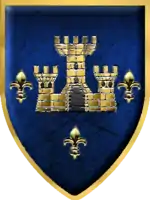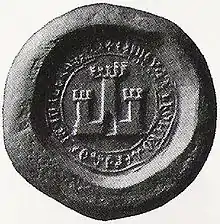Pavlovac (fortress)
The Pavlovac Castle (Serbian Cyrillic: Павловац) was a noble court and one of the largest and most important fortified towns of medieval Bosnia, situated on top of rugged slopes high above the Prača river canyon, near modern days Prača village, in Bosnia and Herzegovina. Fortified castle was a seat of medieval Bosnian noble family Radinović-Pavlović.[1]
| Pavlovac Castle | |
|---|---|
New Town Pavlovac | |
| Prača, Bosnia and Herzegovina | |
 Pavlovac Castle on Radinović-Pavlović family blazon | |
 Pavlovac Castle | |
| Coordinates | 43.754602°N 18.781588°E |
| Type | Castle (residential, fortification) |
| Site information | |
| Owner | Radinović-Pavlović family |
| Controlled by |
|
| Condition | Ruined (National Monument of Bosnia and Herzegovina) |
| Site history | |
| Built | c. 1392 (14th century) |
| Built by | Radoslav Pavlović, head of Radinović-Pavlović |
| In use | 1392-1485 |
| Materials | Limestone |
| Demolished | 1485 |
| Garrison information | |
| Past commanders | Radinović-Pavlović |
| Site is protected as National Monument of Bosnia and Herzegovina by the Government of BiH and its KONS | |
Old and New structure
The family hailed and ruled from Pavlovac. It is the second of two castles in their possession, which the family used as a seat. Two castles were built in the space of several decades and within a few kilometers from each other, second being Borač castle or Old Town, and sometimes Old Borač.
Pavlovac

The new castle or New Town, or sometimes New Borač, is actually called Pavlovac, and is considered to be a new structure, also known simply as Novi (English: New) or Novi Grad (English: New Town). Problem exist in correct dating of its construction, but some medieval charters suggest 1392, or late 14th century, as time of its construction, during Radislav Pavlović at the family's helm.[1][2][3][4]
Old Borač
However, historians are certain that another Radinović-Pavlović fortress existed, original and older Borač castle, which was built around 1244 in 13th century and located just a few kilometers downstream Prača river, between Mesići and villages of Borač and Brčigovo, near modern days Rogatica town, in Bosnia and Herzegovina.[1][2][3][4]
References
- "Borak (Han-stjenički plateau) necropolis with stećak tombstones in the village of Burati, the historic site". Commission to preserve national monuments (in Bosnian). Commission to preserve national monuments. Retrieved 12 May 2015.
- Marko Vego (1957). Naselja bosanske srednjevjekovne države (in Bosnian). Sarajevo: Svjetlost. Retrieved 19 May 2015.
- Alija Bejtić (1966). Rogatica, Srednji vijek (in Bosnian). Sarajevo: Svjetlost.
- Desanka Kovačević-Kojić (1987). Gradska naselja srednjovjekovne Bosanske države (in Bosnian). Sarajevo: Veselin Masleša.
